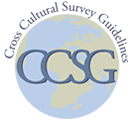- Home
- About Us
- Chapters
- Study Design and Organizational Structure
- Study Management
- Tenders, Bids, and Contracts
- Sample Design
- Questionnaire Design
- Instrument Technical Design
- Translation
- Adaptation
- Pretesting
- Interviewer Recruitment, Selection, and Training
- Data Collection
- Paradata and Other Auxiliary Data
- Data Harmonization
- Data Processing and Statistical Adjustment
- Data Dissemination
- Statistical Analysis
- Survey Quality
- Ethical Considerations
- Resources
- How to Cite
- Help


Appendix E (Survey Items for Activities Lists Template)
Project teams can begin to build detailed activities lists selecting from items in this guideline. By creating a detailed list of survey tasks, the project team can ensure that no aspect of the study structure has been overlooked and can then use this list to assign organizational responsibilities.
Tenders, Bids, and Contracts
- Prepare tenders with detailed requirements.
- Conduct a bidding process and select survey organizations.
- Negotiate and execute contracts.
- Define the target population and determine the sample size.
- Identify the sampling frame.
- Implement a selection procedure.
- Select a comparative question design approach.
- Develop protocols for evaluating questions.
- Adopt questions, adapt questions, and write new questions.
- Identify adaptation needs.
- Modify the questionnaire content, format, or visual presentation.
- Adapt design feature.
- Find, select, and brief translators.
- Use existing or develop translation tools.
- Complete language harmonization.
- Develop design specifications for instruments and a sample management system.
- Develop interface design and programming guidelines.
- Determine testing specifications.
- Determine reporting specifications.
- Determine required characteristics of interviewers.
- Recruit and hire interviewers.
- Select interviewer trainers.
- Create a training plan and determine the necessary training materials. This may involve identifying existing materials or preparing new training materials.
- Determine the appropriate pretest method and design.
- Conduct a pilot study.
- Pretest the survey instrument with the target population.
- Select the appropriate mode and develop procedures for that mode.
- Establish a protocol for managing the survey sample.
- Manage data collection and quality control.
- Consider potential risks and necessary backup plans if goals are not met.
- Investigate para/auxiliary data available & informative to survey errors.
- Choose appropriate paradata indicators for survey error and monitor the indicators starting at the initial phases of data collection.
- Alter features of the survey based on cost/error tradeoff decision rules.
- Perform analysis using paradata to investigate survey errors.
- Determine a harmonization strategy.
- Create technical specifications for systems used for data harmonization.
- Use a systematic approach to harmonize variables.
- Compare and integrate information across data files.
- Code survey responses and enter them into electronic form.
- Edit and clean data.
- Define data quality checks.
- Develop survey weights.
- Preserve key data and documentation files.
- Produce public- and restricted-use data files.
- Prepare final data deliverables and reports.
- Document the survey process.
- Develop quality standards and a quality assurance plan.
- Monitor and support the implementation of quality standards.
- Create informed consent forms and ensure the rights of respondents.
- Observe professional standards and local laws.